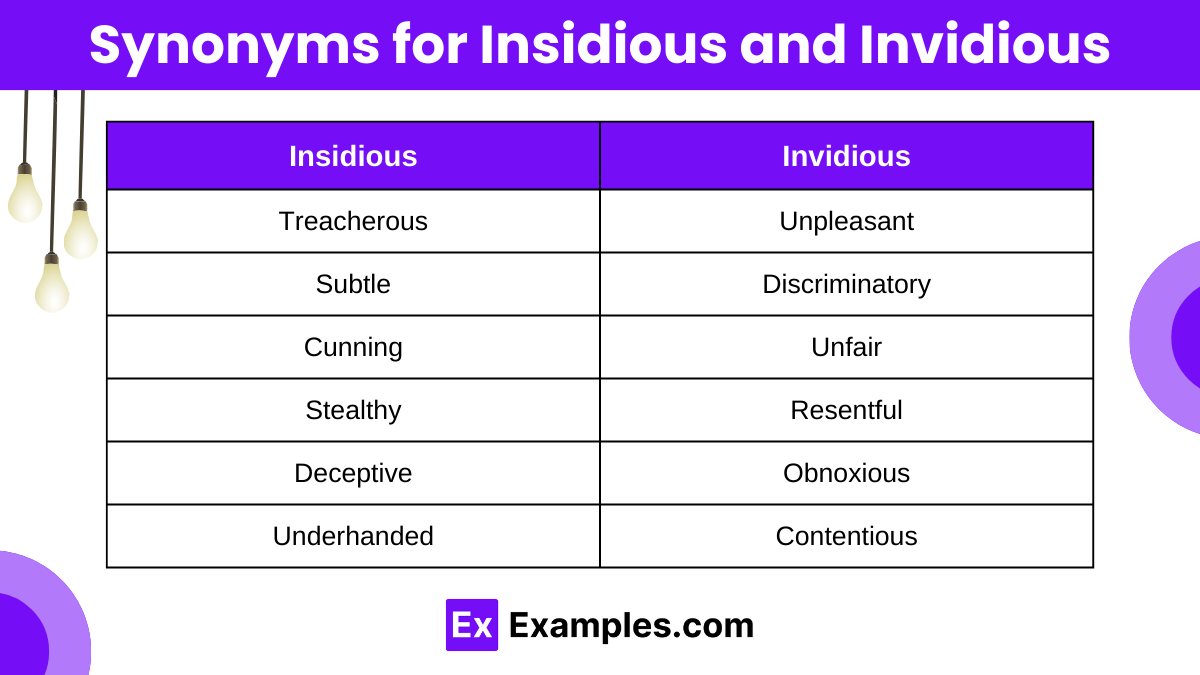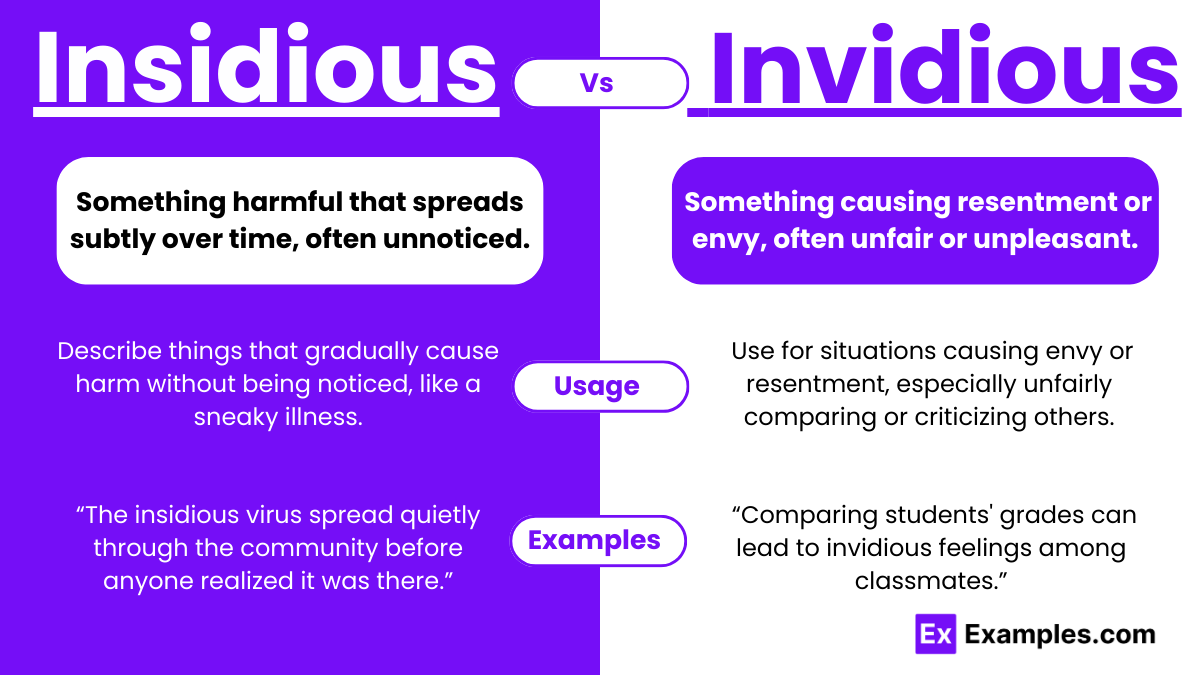Insidious vs Invidious – Meanings, Examples, Differences, Usage
Insidious functions predominantly as an adjective, describing something that proceeds in a subtle way but with harmful effects. It often characterizes diseases, habits, or influences that gradually cause damage without immediate or apparent symptoms. When you want to describe something that is slowly and stealthily harmful, typically without being noticed until too late, you use “insidious.”
Invidious, also primarily an adjective, refers to an action or situation that is likely to arouse resentment or anger in others because it is perceived as unfair or discriminative. It can also describe choices or distinctions that are unwelcome or likely to provoke envy or dislike. When you want to discuss an action or situation that invokes resentment due to perceived injustice, “invidious” is the appropriate term.
Insidious and Invidious – Meanings
“Insidious” refers to something harmful that develops stealthily, often unnoticed until too late, such as diseases or schemes. “Invidious” describes situations or actions that provoke resentment by seeming unfair or discriminatory, like biased decisions.
“Invidious” refers to actions or situations likely to provoke resentment because they seem unfair. Insidious describes subtly harmful things that worsen gradually, often unnoticed. While invidious is linked to injustice, insidious pertains to stealthy harm.
Summery
“Insidious” and “Invidious” are both adjectives describing negative situations but differ significantly in usage. Insidious refers to something harmful that develops slowly and stealthily, often without initial detection, such as a disease. Invidious, however, describes actions or situations that incite resentment or anger because they are deemed unfair or discriminatory. While ‘insidious’ is linked to hidden dangers, ‘invidious’ relates to obvious issues of injustice.
Difference Between Insidious and Invidious
| Aspect | Insidious | Invidious |
|---|---|---|
| Part of Speech | Adjective | Adjective |
| Meaning | Refers to something harmful that develops stealthily and gradually. | Refers to something that arouses resentment or anger due to perceived unfairness. |
| Usage | Used to describe diseases, influences, or changes that are harmful but not obvious. | Used to describe actions, comparisons, or situations that are unfair and discriminatory. |
| Examples | – An insidious disease slowly took hold. | – An invidious comparison between two colleagues. |
| Focus | On the stealthy, harmful progression of something. | On the injustice and resentment caused by something. |
When to Use Insidious and Invidious
Understanding when to use “insidious” and “invidious” correctly can enhance clarity and precision in your communication. Here’s a guide on when to appropriately use each term:
Usage of “insidious”
- Describing something harmful that develops slowly and subtly. This is often without being noticed until serious damage has occurred. It’s commonly used in the context of diseases, habits, or effects.
Example: The insidious spread of misinformation can undermine societies over time.
- Highlighting stealth and gradual deterioration. This word is apt for situations where something is not immediately obvious but poses significant risks or negative outcomes as time progresses.
Example: He was unaware of the insidious corrosion that was weakening the structure.
Usage of “invidious”
- Referring to actions or situations that invoke resentment or anger due to perceived unfairness or discrimination. This term is particularly useful in contexts involving social relationships or organizational decisions.
- Example: Her invidious remarks about coworkers created a hostile work environment.
- Discussing choices or tasks that are likely to be unpleasant because they cause envy or resentment among others. It’s a fitting choice when addressing issues that naturally lead to conflict or discomfort.
- Example: The committee faced the invidious task of deciding which programs would be cut due to budget constraints.
How to Use Insidious and Invidious
Insidious
Insidious is an adjective often used to describe something that proceeds gradually and subtly but results in serious harm. Here are some tips on how to use it:
- Contexts of gradual harm: Use “insidious” in situations where the harm or negative effect develops slowly over time and is not immediately obvious. This is common in medical, psychological, and social contexts.
Example: The cancer had an insidious onset, showing almost no symptoms until it was too late.
- Metaphorical use: “Insidious” can be used metaphorically to describe actions, influences, or changes in society that slowly erode foundations or principles.
Example: There’s an insidious influence of excessive commercialization on traditional festivals.
Invidious
Invidious also serves as an adjective but focuses on describing things that are likely to arouse resentment, anger, or envy, particularly because they are unjust, discriminatory, or favor some over others. Here’s how to use it:
- Describing unfair situations: Use “invidious” when talking about situations, choices, or remarks that are likely to provoke resentment because they are seen as unjust or partial.
Example: Making employees compete openly for a single promotion is an invidious strategy.
- Highlighting discrimination or envy: “Invidious” is appropriate when the context involves discrimination or envy, especially when someone or something is unfavorably compared to others.
Example: It’s an invidious position to be in, choosing between one’s career and one’s health.
Synonyms for Insidious and Invidious

| Insidious | Invidious |
|---|---|
| Treacherous | Unpleasant |
| Subtle | Discriminatory |
| Cunning | Unfair |
| Stealthy | Resentful |
| Deceptive | Obnoxious |
| Underhanded | Contentious |
| Sneaky | Divisive |
| Dangerous | Jealous |
| Pernicious | Detrimental |
| Sly | Envious |
Antonyms for Insidious and Invidious
| Insidious | Invidious |
|---|---|
| Beneficial | Fair |
| Harmless | Just |
| Innocuous | Pleasant |
| Open | Complimentary |
| Blatant | Welcoming |
| Overt | Congenial |
| Healing | Unifying |
| Straightforward | Harmonious |
| Safe | Equitable |
| Honest | Encouraging |
Examples of Insidious and Invidious
Insidious
- The insidious nature of the disease made it difficult to diagnose.
- He had an insidious plan to overthrow the board.
- Insidious rumors about the new policy spread through the office.
- An insidious decline in the quality of products went unnoticed.
- Climate change is an insidious threat to global biodiversity.
- The insidious erosion of civil liberties can start with small changes.
- Social media can have an insidious impact on mental health.
- The insidious spread of invasive species threatens native ecosystems.
- An insidious sense of distrust crept into their friendship.
- The malware had an insidious effect on the company’s systems.
Invidious
- The new policy put her in an invidious position with her team.
- His comments during the meeting were invidious and unwelcome.
- The comparison between the two students was invidious and unfair.
- It was an invidious task to tell the employees about the layoffs.
- The invidious distinction between the two groups fueled conflict.
- The invidious nature of the article caused a public outcry.
- Her invidious remarks about colleagues caused much resentment.
- Being forced to choose which project to fund was an invidious decision.
- The debate was marred by invidious attacks on personal integrity.
- The invidious terms of the agreement made it unpopular from the start.
Exercise
Fill in the blank with the correct form of “insidious” and “invidious”:
Questions:
- The ________ growth of the tumor was not detected until the advanced stages.
- Such ________ comparisons between employees can lead to a toxic workplace environment.
- The rise of the surveillance state is an ________ development in many countries.
- Facing such an ________ choice, she felt like there was no right answer.
- The ________ spread of the virus in the community was initially underestimated.
- The law was criticized for imposing ________ restrictions on certain groups.
- His ________ influence on the committee swayed the decision in his favor.
- The ________ comments made during the debate only served to deepen the division.
- An ________ decline in water quality could have catastrophic effects on marine life.
- They had to make an ________ decision between cutting staff or reducing salaries.
Answers:
- insidious
- invidious
- insidious
- invidious
- insidious
- invidious
- insidious
- invidious
- insidious
- invidious
What Does it mean when something is Insidious?
When something is insidious, it means it’s deceitful or harmful but subtle and gradual, often spreading without being noticed, making it difficult to detect or eradicate.
What Part of Speech is the Word Insidious?
The word “insidious” functions as an adjective, describing something that is deceitful or harmful in a subtle and gradual manner, often spreading without being noticed.
What Word Does Insidious Modify?
The word “insidious” typically modifies nouns, describing them as deceitful or harmful in a subtle and gradual manner. For example, “an insidious disease” or “an insidious plan.”



